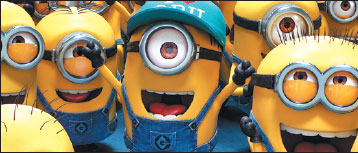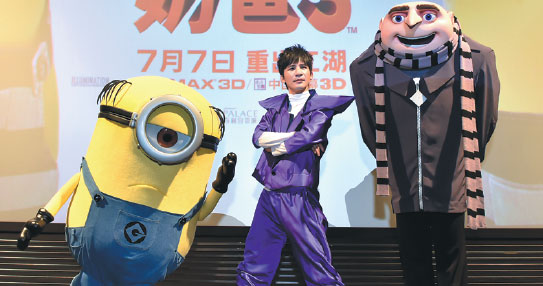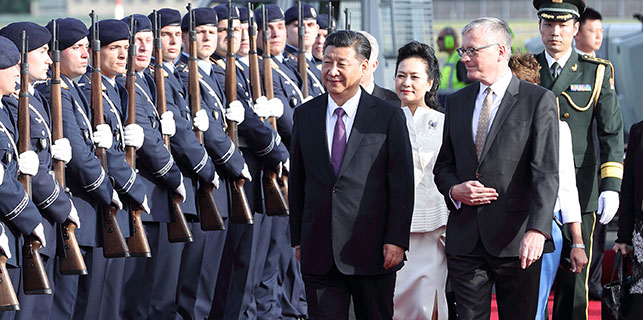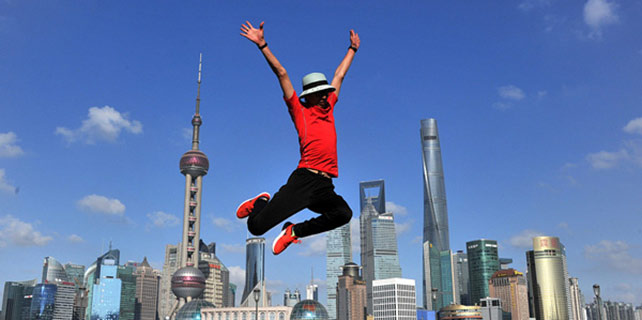Local celebrities add star power to Hollywood films with their voices
Singer and TV host Zhang Wei, dressed in a purple jumpsuit, tackles the evil Gru and a Minion - played by two performers-in a downtown Beijing theater.
In his colorful garb, Zhang, who does the voice-over in the Mandarin version of Despicable Me 3, is reliving a scene from the franchise's newest film.
Zhang plays Balthazar Bratt, who was once a popular child star but grows up to be a super villain.
|
Singer Zhang Wei, who did the voice-over in the Mandarin version of Despicable Me 3, promotes the movie at a Beijing event. Photos Provided to China Daily |

Bratt's costume in the movie is what Zhang wore at the Beijing event on June 30, as Hollywood uses Chinese star power again to boost a movie's popularity in the country.
One of the world's most commercially successful animated movie franchises, Despicable Me is charming with its Minions, a group of cute yellow creatures wearing blue overalls and goggles.
Despicable Me 3, the fourth movie of the franchise, which includes a spin-off movie Minions, topped North America's box-office charts over the weekend with $75 million in three days.
It will open across the Chinese mainland on Friday.
In the movie, Gru reunites with his twin Dru and they team up to fight Bratt, who steals a giant diamond to terrorize Hollywood.
"Bratt is not a typical villain," says Zhang, speaking about his role at the event.
Zhang shot to prominence, thanks to a teenage rock band called The Flowers in the late 1990s, and was known for imitating pop idols on Hunan Satellite TV's hit variety show Your Face Sounds Familiar.
Zhang says the voice-over job was challenging and adds: "A veteran coached me. He demanded I speak the words in a way that matched the movements of the creature's mouth."
"I speak a bit fast and unclearly (in daily life). So I was concerned about not qualifying for the job."
But that was clearly not a problem, as Zhang is followed by 7.4 million fans on Sina Weibo - the Chinese equivalent of Twitter.
A trailer featuring his voice has drawn more than 10 million views on several mainstream Chinese streaming sites, such as qq.com.
Using local stars to do voice-overs for animated movies is an old marketing strategy for Hollywood.
Jiang Yong, a Beijing-based industry analyst, says the first such attempt was with Disney's 1998 epic Mulan, and featured actress Xu Qing in the lead role, Jackie Chan as Capital Li Shang and comedian Chen Peisi as the dragon Mushu.
When Mulan was released in the Chinese mainland in 1999, Chen's unique voice created a sensation.
In the early years, the animated movies used veteran actors to do the voice-overs, says Jiang, but he says that the picture has changed since the mid-2000s, as China's entertainment industry began to take off.
Jiang says that now pop idols or non-actor celebrities are doing voice-overs for Hollywood animated movies.
For instance, Sony Pictures' 2006 comedy Open Season had director Feng Xiaogang provide his voice for the grizzly bear Boog, and singer Li Yuchun was Tip in Dream-Works' 2015 sci-fi animated movie Home.
"The celebrities may not be as qualified as professional actors, but their voices are very appealing to locals," says Jiang.
xufan@chinadaily.com.cn
(China Daily 07/06/2017 page19)























